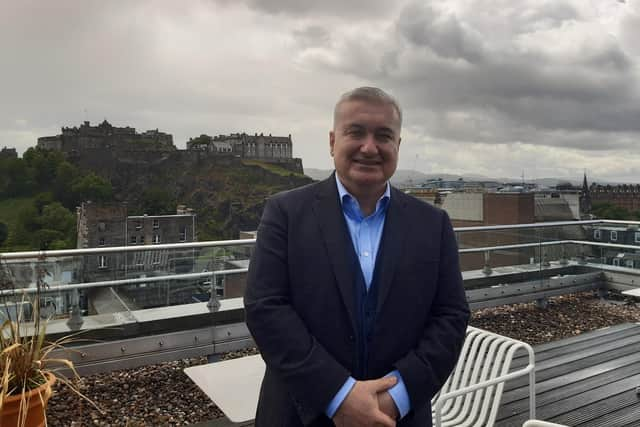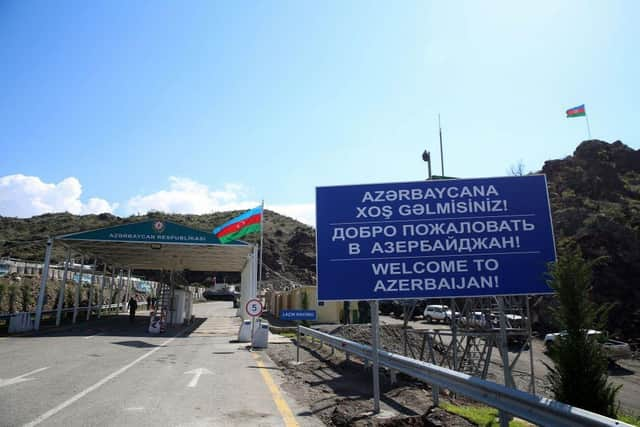How US peace talks are crucial to Azerbaijan's future and in shaping the Russian war against Ukraine
As Azerbaijan’s ambassador to the UK landed in Scotland on Monday, his government’s foreign minister, Jeyhun Bayramov, was on his way to Washington DC, where he was set to embark on the latest round of peace talks with neighbouring Armenia.
"We do hope to have progress towards peace after these talks,” says ambassador Elin Suleymanov, whose diplomatic brief covers not only Britain, but Ireland, Denmark and Iceland. He is on his second trip north of the border, having visited once before to attend COP26 in 2021.
Advertisement
Hide AdAdvertisement
Hide AdAzerbaijan, which recently signed a lucrative gas deal with the European Union in a bid to reduce the bloc’s reliance on Russian energy and has built its wealth on oil and gas, is looking towards Scotland as a leader in green energy production.


However, this week, all eyes are on the situation in Nagorno-Karabakh.
Azerbaijan and Armenia have been at loggerheads since the middle of the last century over the disputed region and the surrounding territories, which lies between their borders. Although internationally recognised as a part of Azerbaijan, the region is controlled by ethnic Armenians and is regarded as one of Europe’s frozen conflicts.
A violent escalation of the dispute in 2020 which saw thousands of people killed, eventually gave way to a ceasefire brokered by Russia. More than 2,000 Russian peacekeeping forces were subsequently deployed to the region – but relations have continued to be volatile over the past three years.
On a two day visit to Edinburgh to meet MSPs, Mr Suleymanov says he believes it is a critical time for the two sides to resolve their dispute in a bid to create stability in what has become a volatile region. He points out that no other country has the “pleasure and distinction” of Azerbaijan’s unique geographic location, sharing a border with both Russia and Iran.


While Azerbaijan has supported Ukraine – it was one of the first countries to provide physical aid after the invasion began and was attended the international Ukraine Recovery Conference in London last week, where it pledged to offer Kyiv its expertise in dealing with landmines – it cannot be seen to get too closely involved in the conflict with Russia.
"I think this [peace in Nagorno-Karabakh] is fundamental,” Mr Suleymanov says. “The region is changing. There's a lot of instability. Not just in terms of the Ukraine situation, but also some challenges in the behaviour of our neighbours.”
The latest wave of peace talks began this spring. Little was revealed about the first discussions, brokered by US Secretary of State Antony Blinken, while the second, which took place in Moldova earlier this month, ended in Azerbaijan accusing French President Emmanuel Macron of “distorting” what was discussed. A press statement released by France after the meeting had “stressed the importance of defining rights and guarantees for the Armenians of Nagorno-Karabakh”.
Advertisement
Hide AdAdvertisement
Hide AdThe difficulty in compromising on the fate of ethnic Armenians in Nagorno-Karabakh is likely to continue to be a key sticking point for officials on both sides.
However, Mr Suleymanov believes progress could be made. The talks between Mr Bayramov and his Armenian counterpart Ararat Mirzoyan, began on Tuesday and are likely to finish at the end of the week.
"We do hope to have – perhaps not an actual agreement physically – but we do hope to have progress towards peace after this talks,” he says.
"I hope my Armenian neighbours understand that and I hope they will move forward to this agenda. We see some hopeful statements, but the actions are not there yet.”
However, he is not happy with some UK politicians’ stance on the conflict – or with other countries’ political grievances disrupting mediation attempts.
"President [Ilham] Aliyev said to Armenians that it's time to close the chapter of negativity, over and over again,” he says. “But also it is also important that our international partners support steady progress for peace because sometimes, people say ‘oh, if Russia is part of the agreement, I don’t like that’ or Russia comes out and says ‘I don’t like Washington’.
"Anybody who can facilitate should facilitate; anybody who has a temptation of undermining that should not do that.”
He adds: "Sometimes this misunderstanding I hear from some Scottish MPs as well, at Westminster. Either misleading the situation or maybe saying things which may not fully be conducive to this.”
Advertisement
Hide AdAdvertisement
Hide AdAlthough he would not be drawn on exactly what he is referring to, it is likely his comments relate to speeches made in the House of Commons in January by SNP MPs, who warned during a debate relating to blockades of a key land corridor between Nagorno-Karabakh and Armenia, that the situation had become “a truly horrific humanitarian catastrophe”, and claimed there had been “collusion” between the Russian peacekeeping forces and Azerbaijan in blocking the corridor, which still remains almost entirely closed.
Mr Suleymanov points to sacrifices on both sides of the conflict and urges the international community to move beyond “the past negativity”.
"So many people died,” he says. “We should never forget and I don't expect Armenians to do so. But the outcome now is quite urgent, given the situation around the world and in our region and we need to move forward with a decision as soon as possible.
"These historic grievances should not become the basis for the future.”
Azerbaijan is keen to increase ties with Scotland. The UK is the largest foreign investor in Azerbaijan, which has recently become a leading generator of renewable energy from hydro to wind and solar, while Scottish diplomat Fergus Auld is currently the UK’s ambassador in Azerbaijan’s capital, Baku.
While he bandies around terms like “net zero” – mainly in relation to a COP27 commitment to create a “net zero emission zone” in the “liberated territories” in Karabakh by 2050 - Mr Suleymanov is also quick to point out that Europe is now turning back to fossil fuels following the Ukraine invasion and subsequent energy crisis.
Scotland, in contrast, has a plan for a “just transition” to move entirely away from oil and gas by 2045.
“We're very focused on this [renewables] now,” he says. “Of course, aspirations and intentions are not always the same as the outcome, but the fact that the country which is which is best known to be a birthplace of oil boom is now focusing on this is indicative. At the same time, I think we should take these things realistically.
Advertisement
Hide AdAdvertisement
Hide Ad"At COP26, not too long ago here in Scotland, all fossil fuels were basically criminalised. Now people are returning to coal, which I think is horrible. And the reason for that is because people rush too much to decrease gas production and now they have to go to much dirtier fuel. I think natural gas is a very good transitional fuel as it is much cleaner than fuel, it is economical and gives you this necessary leverage and time to transition.”
Comments
Want to join the conversation? Please or to comment on this article.
